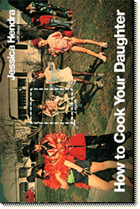Kids Say the Darndest Things
October 11, 2005
 When I heard the title of Jessica Hendra’s book, “How to Cook Your Daughter,”
When I heard the title of Jessica Hendra’s book, “How to Cook Your Daughter,” I wasn’t sure if I wanted to read it. The title is taken from the title of a story by her father, Tony Hendra, that appeared in the July 1971 (Kids) issue. I had heard about, but not followed, the story that broke this last summer in The New York Times in which she revealed that her father’s bestselling and critically praised book, “Father Joe,” which purports to be a confessional of a lifetime of sins, neglected to include his sexual abuse of her as a child.
Could it be true? I didn’t really want to know. It’s not the kind of thing I enjoy reading or hearing about. When I first read the “How to” story in National Lampoon many years ago, it read like a sexual fantasy. That in itself was disturbing, but surely that was the intended effect; “nothing sacred,” and all that. It’s so sick, it’s funny, right? Yet, it made me wonder what kind of relationship this guy had with his daughter.
So, when I got a “heads up” email about the book and I saw the title, I realized my worst suspicions would probably be confirmed. With a considerable amount of apprehension, I got hold of a copy and read it.
I don’t think “enjoyable” is the appropriate word to use for a book like this, but I found her story very compelling and well-written. The undercurrent of sexual abuse is always present, sometimes far in the background, sometimes front and center, but the book also expresses Jessica’s love and admiration for her father, as contradictory as that sounds. Tony comes off as a talented genius with some rather tragic flaws. She portrays him not as a monster, but as a human being.
There are many stories in the book about Lampoon staffers’ frequent visits to the Hendras’ house in New Jersey. I don’t think I’ve ever read another account that made them such flesh and blood creatures as this book. Much of the book reads like a child’s account of growing up with the National Lampoon, with fascinating behind-the-scenes stories (such as the fact that she and her sister Kathy used to sing songs from “Lemmings” the way other kids sang songs from “The Little Mermaid”).
In spite of my admiration for many of the things Tony Hendra has done and written over the years, particularly his book “Going Too Far,” I have to sadly admit that, after reading the book, I find Jessica’s story believable. It’s a bit extreme to go public with such a story of private shame and abuse, but it appears that it was her father’s own actions—and inactions—that ultimately led her to do it.
If you are a fan of National Lampoon‘s “golden age,” I would definitely recommend this book, in spite of the horrible story that precipitated and permeates it.
Comments
No comments yet.
Original material (excluding quoted material) © 1997-2024 Mark Simonson.
Mark's Very Large National Lampoon Site is not affiliated with National Lampoon or National Lampoon Inc.
Click here for the real thing.

Leave a Reply